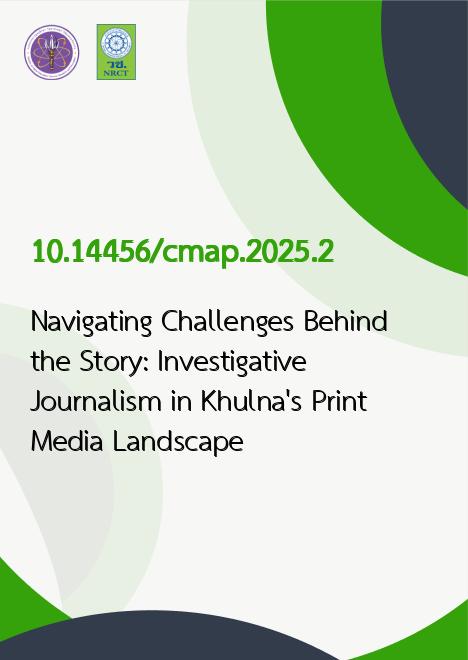
|
Navigating Challenges Behind the Story: Investigative Journalism in Khulna’s Print Media Landscape |
|---|---|
| รหัสดีโอไอ | |
| Creator | Tehosin Ashraf Prottoy |
| Title | Navigating Challenges Behind the Story: Investigative Journalism in Khulna’s Print Media Landscape |
| Contributor | Mamunor Rashid, Sara Monami Hossain |
| Publisher | Faculty of Communication Arts, Chulalongkorn University |
| Publication Year | 2568 |
| Journal Title | Communication and Media in Asia Pacific |
| Journal Vol. | 8 |
| Journal No. | 1 |
| Page no. | 17-30 |
| Keyword | Investigative journalism, Print media, Political economy of media, Agenda setting, Bangladesh |
| URL Website | https://so01.tci-thaijo.org/index.php/CMAP/ |
| Website title | Communication and Media in Asia Pacific |
| ISSN | 2630-0621 |
| Abstract | Investigative journalism is crucial in promoting transparency, accountability, and democratic governance. However, this study reveals that investigative journalists working in print media in Khulna City, the third-largest urban center in Bangladesh, face significant institutional, political, and economic barriers that hinder their ability to conduct impactful reporting. Through qualitative data collected via 18 in-depth interviews and one focus group discussion involving a total of 24 journalists from local and national newspapers, the study identifies key challenges including lack of logistical and financial support, legal harassment under the Digital Security Act (2018), editorial gatekeeping, political pressure, and limited access to information through the Right to Information Act. The findings highlight how regional journalists are systematically marginalized, receiving fewer resources and less recognition than their Dhaka-based counterparts. The political economy of media and agenda-setting theory provides practical frameworks for understanding how ownership structures, editorial biases, and commercial interests shape the visibility and viability of investigative reports. This study contributes to the existing literature by focusing on the underexplored regional dynamics of investigative journalism in South Asia. It also offers practical recommendations for strengthening the profession through policy reform, institutional support, and professional development initiatives. |